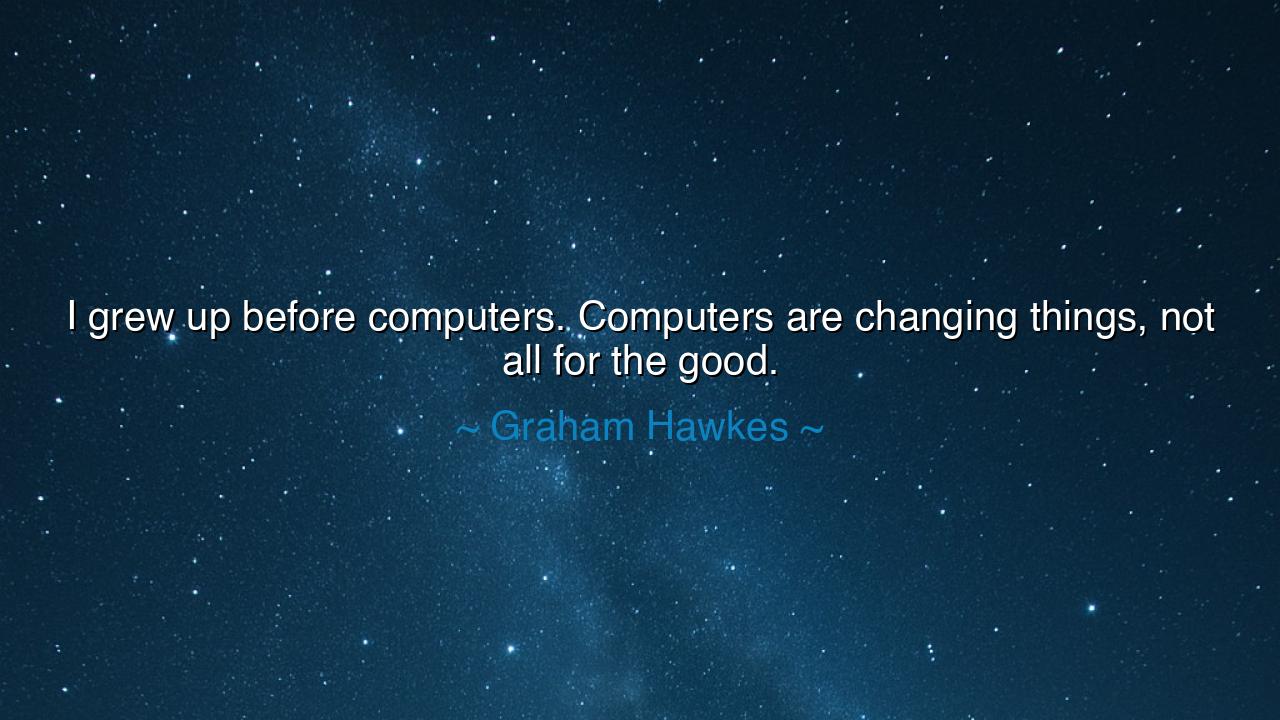
I grew up before computers. Computers are changing things, not






“I grew up before computers. Computers are changing things, not all for the good.” Thus spoke Graham Hawkes, the explorer of the deep seas — a man who gazed into both the silent oceans and the rising tide of technology. His words echo like a current beneath the surface of our age, stirring reflection and warning alike. For in this simple confession lies the voice of one who has seen the world before the reign of screens — before the hum of machines became the song of daily life. He speaks not with bitterness, but with the sadness of one who has watched wonder change its shape, and the rhythm of life grow faster, yet somehow thinner.
In the ancient days, wisdom flowed slowly, like rivers wearing down stone. People built with their hands, thought with patience, and knew the texture of the real. The world of pre-computer life was bound by touch — the crackle of firewood, the scratch of ink, the creak of a ship against the tide. Hawkes, who devoted his life to building submersibles and exploring the unknown, came from this world — one where invention was still a conversation between human breath and the living earth. He knew the joy of creation born not from automation, but from struggle and sweat.
Yet as he looked upon the world of circuits and data, he saw that computers were changing things — and he was not wrong. They have indeed transformed every art and science, turning oceans of information into rivers at our fingertips. The young today can reach farther in a moment than explorers of old could in a lifetime. But Hawkes reminds us that progress has a shadow: that as machines grow smarter, the human heart risks growing distant. We begin to value what is fast over what is felt, what is efficient over what is alive. The world, once vast and mysterious, now fits inside a screen — and with that convenience comes a quiet loss.
Consider the story of Jacques Cousteau, the great ocean adventurer of the twentieth century. He too lived before the digital flood, and like Hawkes, he built his understanding not through algorithms but through immersion — diving into the sea, face-to-face with its mystery. He spent his life teaching others to love the ocean, not merely to study it. When Cousteau spoke of the sea, it was not as data, but as a living spirit. He believed that to understand, one must feel. This is what the computer cannot yet do — it can measure the depth of the ocean, but not the awe that it inspires.
Hawkes’ warning, then, is not against technology itself, but against forgetfulness. He calls us to remember what the computer cannot replicate: curiosity born of silence, patience learned through waiting, creativity born from imperfection. For while machines can build, calculate, and even learn, they cannot dream. They can draw a map of the world, but they cannot feel the wind or hear the music of the waves. It is the human soul that brings meaning to the data, not the other way around.
There is wisdom in his nostalgia. To “grow up before computers” is to have known the world as something vast and tactile — a place not yet tamed by algorithms. Those who lived in that time understood slowness as a virtue. They knew the satisfaction of a task done by hand, of learning that unfolded not instantly, but deeply. The new age has given us speed, but it has also stolen silence; it has given us knowledge, but sometimes taken away wonder.
The lesson, then, is not to reject the machine, but to master it without losing the soul. Use the computer as Hawkes used his submarine — as a vessel to explore the unknown, not as a cage to live inside. Do not allow convenience to replace curiosity, or connection to replace contemplation. Make time to feel the world beyond the screen: the wind, the soil, the weight of a page, the gaze of another human being. For these are the things that root us in reality, the things that make wisdom breathe.
So remember Hawkes’ quiet truth: computers are changing things — not all for the good. Let them serve you, but never let them steal from you the one gift they cannot hold — your humanity. Be both the dreamer and the builder, the user of tools and the keeper of soul. For the future belongs not to those who code the fastest, but to those who remember why we began to create at all — not for speed, nor for profit, but for the deep and timeless joy of being human.






AAdministratorAdministrator
Welcome, honored guests. Please leave a comment, we will respond soon